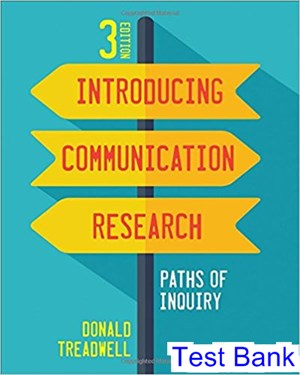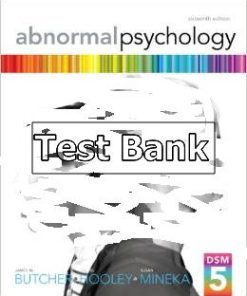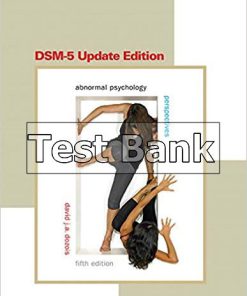Introducing Communication Research Paths of Inquiry 3rd Edition Treadwell Test Bank

Product details:
- ISBN-10 : 1483379418
- ISBN-13 : 978-1483379418
- Author: Donald Treadwell
Introducing Communication Research: Paths of Inquiry helps students understand the communication research process from start to finish. The Third Edition has been updated throughout to explain the Internet and social media as tools and topics for communication research. Streamlined, accessible, and with campus-based research examples that students can relate to, this text guides students through the fundamentals of conducting research and presenting research findings for scholarly, professional, news/media, and web audiences.
Table contents
Chapter 1 • Getting Started: Possibilities and Decisions
Chapter Overview
Chapter Objectives
Getting Started in Research
Basic Assumptions Behind Communication Research
Some Research Possibilities: What Can We Do With an Ad?
Some Research Possibilities: Beyond the Ad
A Series of Unavoidable Decisions
Ethics Panel: A Health Communication Dilemma
Chapter Summary
Key Terms
Application Exercises
Recommended Reading
Recommended Web Resources
References
Chapter 2 • First Decisions: From Inspiration to Implementation
Chapter Overview
Chapter Objectives
Starting With Basic Beliefs and Perspectives
Starting With a Focus
Starting With a Purpose
Starting With the “What” Question
Starting With “Who,” “Where,” and “When” Questions
Starting With the “How” Question
Starting From the Work of Others
Ethics Panel: Do Some Research Methods Have More Ethical Implications Than Others?
Chapter Summary
Key Terms
Application Exercises
Recommended Reading
Recommended Web Resources
References
Chapter 3 • Ethics: What are My Responsibilities as a Researcher?
Chapter Overview
Chapter Objectives
Introduction: Some Ethical Decisions
Ethics Issues in Communication Research
Some Classic Ethical Positions
Two Brief Histories—Or Why We Care About Research Ethics
Contemporary Codes of Ethics
Regulations
Peer Review and Institutional Review Boards
What Should I Call You? The Ethics of Involvement
The Internet and Research Ethics
Ethics Panel: Data Security and Access
Chapter Summary
Key Terms
Application Exercises
Recommended Reading
Recommended Web Resources
References
Chapter 4 • You Could Look It Up: Reading, Recording, and Reviewing Research
Chapter Overview
Chapter Objectives
Library Research: Why Bother?
Finding Relevance, Finding Quality
Scholarly Databases Versus Search Engines
Scholarly Journals: A Good Starting Point
Scholarly, Popular, and Trade Publications: What Is the Difference?
Primary Versus Secondary Sources
Search Strategies: General to Specific and Specific to General
Search Terms and Search Fields
How Can the Library of Congress Help My Literature Search?
Other Resources
Being Skeptical About Information: Websites and Fake News
Mr. Boole and the Three Bears
Saving Your Search Results
Reviewing the Literature
The Literature Review: Writing Your Search Results
Ethics Panel: The Ethics of Scholarly Publication
Chapter Summary
Key Terms
Application Exercises
Recommended Reading
Recommended Web Resources
References
Chapter 5 • Measurement: Research Using Numbers
Chapter Overview
Chapter Objectives
What Do Your Head Size, Attitudes, and Readability Have in Common?
An Introduction to Scales
Research NOIR
To NOIR Is Not Enough: Reliability and Validity
Reliability
Validity
Two Common Measurement Scales
Ethics Panel: The Ethics of Measurement Scales
Chapter Summary
Key Terms
Application Exercises
Recommended Reading
References
Chapter 6 • Sampling: Who, What, and How Many?
Chapter Overview
Chapter Objectives
Introduction
Nonprobability Sampling
Probability Sampling
How Big Does My Sample Have to Be?
Some Issues With Sampling Frames
Ethics Panel: Checking the Ethics of Survey Research
Chapter Summary
Key Terms
Application Exercises
Recommended Reading
Recommended Web Resources
References
Chapter 7 • Summarizing Research Results: Data Reduction and Descriptive Statistics
Chapter Overview
Chapter Objectives
Introduction
Data Reduction
Measures of Central Tendency: Mean, Median, and Mode
Measures of Dispersion: Minimum, Maximum, Range, Interquartile Range, Variance, and Standard Deviation
z Score
The Chi-Square Test
Ethics Panel: Can Rankings Be Misleading?
Chapter Summary
Key Terms
Application Exercises
Recommended Reading
Recommended Web Resources
References
Chapter 8 • Generalizing From Research Results: Inferential Statistics
Chapter Overview
Chapter Objectives
Introduction
Generalizing From Data: Inferential Statistics
Testing for Differences Between and Among Groups
Testing for Relationships Between and Among Variables
Two Final Decisions
Ethics Panel: A Communicative Tension
Chapter Summary
Key Terms
Application Exercises
Recommended Reading
Recommended Web Resources
References
Chapter 9 • Surveys: Putting Numbers On Opinions
Chapter Overview
Chapter Objectives
Introduction: Advantages and Disadvantages of Surveys
Types of Surveys
Survey Methods
Writing, Introducing, and Formatting Questions
Survey Wording: “If It Can be Misinterpreted, It Will Be”
Improving Survey Response Rates
Using Other People’s Surveys
Big Data and the End of Surveys?
Ethics Panel: Clients and Methods as Ethical Decisions
Chapter Summary
Key Terms
Application Exercises
Recommended Reading
Recommended Web Resources
References
Chapter 10 • Experiments: Researching Cause and Effect
Chapter Overview
Chapter Objectives
Introduction: Advantages and Disadvantages of Experiments
Field Experiments and Ex Post Facto Designs
Basic Experimental Design
Designing for Control
Designing for Random Assignment
Factorial Designs
Between-Subjects and Within-Subjects Design
Time Series Analysis
Validity and Experimental Design
Online Experiments
Ethics Panel: Two Famous and Controversial Experiments
Chapter Summary
Key Terms
Application Exercises
Recommended Reading
Recommended Web Resources
References
Chapter 11 • Quantitative Understanding of Content: Content Analysis
Chapter Overview
Chapter Objectives
Introduction: Advantages and Disadvantages of Content Analysis
A Basic Content Analysis
A Basic Content Analysis: Further Questions
Content Analysis of Human Interaction
Content Analysis of the Web
Computer Analysis of Content
Content Analysis as Quantitative and Qualitative
Ethics Panel: Could Content Analysis Result In Harm?
Chapter Summary
Key Terms
Application Exercises
Recommended Web Resources
References
Chapter 12 • Qualitative Understanding of Content: Rhetorical and Critical Analyses, and More
Chapter Overview
Chapter Objectives
Introduction: Advantages and Disadvantages of Qualitative Analyses of Content
Rhetorical Analyses
Narrative Analysis
Metaphor Analysis
Discourse Analysis
Conversation Analysis
Semiotics
Critical Analyses
Ethics Panel: Research as Manipulative Practice
Chapter Summary
Key Terms
Application Exercises
Recommended Reading
Recommended Web Resources
References
Chapter 13 • Qualitative Understanding of Communication Behavior: Interviews, Focus Groups, and Ethnography
Chapter Overview
Chapter Objectives
Introduction: Advantages and Disadvantages of Watching and Listening Methods
Qualitative and Quantitative: Similarities and Differences
Researcher-Participant Relationships
Watching and Listening Methods
Making Sense of Qualitative Data
Ethics Panel: In Which a Professor Becomes a Student
Chapter Summary
Key Terms
Application Exercises
Recommended Reading
Recommended Web Resources
References
Chapter 14 • Research Results In Print and Online: Writing and Presenting for Scholarly and Other Publics
Chapter Overview
Chapter Objectives
Introduction
The Publics of Research
The Voices of Research
Disseminating Research
Visualizing Research
Ethics Panel: Balancing Between Scholarly and Popular Writing
Chapter Summary
Key Terms
Application Exercises
Recommended Reading
Recommended Web Resources
References
Glossary
Index
About the Authors
People also search:
introducing communication research 3rd edition
3 things to improve communication skills
examples of communication research
3 ways to improve communication skills
introducing communication research
Instant download after Payment is complete













